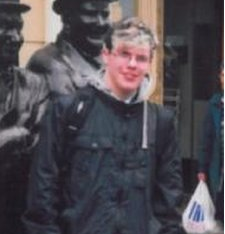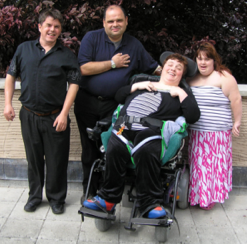This is the second article in a series on hate crime in the UK. Read the first article, “Making Victim Reporting Accessible,” here.
The 1,744 disability hate crimes reported to police in the England and Wales from 2011-12 were just a drop in the ocean, with many disabled people experiencing harassment, bullying and violence on a daily basis and never reporting it.
Disability hate crime campaigner Stephen Brookes told Not In Our Town that only 3 percent of hate crimes targeting disabled people end up in hate crime statististics. This is supported by a recent report on disability hate crime, which revealed that disability hate crime is a large-scale problem that is rarely reported and not always dealt with well. The report stated that the police are often ill-informed about disability hate crime or feel awkward asking people whether or not they have a disability. As a result, many disabled people feel that reporting incidents to the police may have no consequences, or even negative consequences.

Steven Simpson, a young man with Asperger's
Syndrome, died shortly after his 18th birthday,
where his guests doused him in tanning oil
and one set him on fire. Credit: BBC
Syndrome, died shortly after his 18th birthday,
where his guests doused him in tanning oil
and one set him on fire. Credit: BBC
Tackling this problem requires “groups of people and organisations working toward one end, the reduction of disability hate crime,” an approach Brookes calls “joined-up thinking.” As an example he cites a new hate crime reporting service in Blackpool, Lancashire, a city where 25 percent of the population has a disability. At the Blackpool Centre for Independent Living, people can report hate incidents to trained volunteers with disabilities, who then talk to the police or other organizations who can take action.
Another example of joined-up thinking is national intellectual disability charity Mencap’s Stand By Me campaign. It has been making strides towards increased reporting and better police procedures for disability hate crime, with 40 out of 44 police forces in England, Wales and Northern Ireland already pledging to improve how they help victims of intellectual disability hate crime. Mencap has also produced a document outlining best practices for dealing with disability hate crime, to be used by police officers.
Hate crime and “mate crime”
Mencap says that as many as 9 out of 10 people with intellectual disabilities have been victims of hate crime or bullying. One common form of abuse is “mate crime,” victimization wherein a person with an intellectual disability gets to know and trust someone who goes on to abuse or exploit them. Mate crimes can range in severity from financial exploitation to murder.
BBC News recently highlighted the heartbreaking case of a man with an intellectual disability who got to know two young women who later plied him with alcohol, threatened him with a fake gun and sexually assaulted him. Earlier this year, an instance of “mate crime” in the U.S. made national headlines. Federal hate crime charges were filed for the first time in defense of people with disabilities after a Philadelphia woman tricked several people with intellectual disabilities into declaring her their caretaker.

These are some of Safety Net's future
trainers on intellectual disability hate crime.
Credit:Safety Net
trainers on intellectual disability hate crime.
Credit:Safety Net
Safety Net, run by the Association for Real Change, has been fighting mate crime since 2009, empowering people with intellectual disabilities to avoid exploitative relationships. Safety Net has produced an easy-read guide to mate crime for people with intellectual disabilities and their families, and participates in a training program in Devon and Cornwall which trains people with intellectual disabilities to become trainers. Once qualified, these individuals teach others about disability hate crime and mate crime. The organization also speaks to school groups, affirming that just like anyone else, people with disabilities deserve to be treated with respect.
In an interview on ITV Central Tonight, Jaqui Bell from Safety Net described mate crime as “one of the crimes that is most likely to go unreported,” because many victims are unwilling to risk losing their friends, even if their friends are exploiting them. This is why efforts to help people with disabilities avoid abusive relationships, to teach caretakers and family members about mate crime, and to increase the capacity of the police to assist people with intellectual disabilities, must be combined in the fight against this cruel form of crime.
Building a network
The Disability Hate Crime Network, established by Brookes to connect people with disabilities and encourage reporting, features new stories of hateful violence almost every day. However, it also frequently highlights stories about new or continuing efforts to bring disability hate crime to light and support its victims, from local government, police forces, anti-hate organizations, and individuals.
It seems that a broad-based movement to stop disability hate crime in the UK is fighting on all fronts, and the energy, creativity and dedication of campaigners against disability hate crime should be an inspiration to all those who fight against hate.
Comments
Nice information....
Nice information....
Add new comment